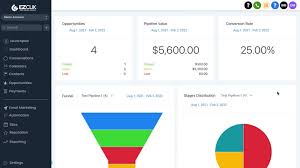In the dynamic landscape of modern marketing, where personalized engagement and efficiency are paramount, the adoption of marketing automation has emerged as a game-changer for businesses seeking to optimize their strategies. Marketing automation encompasses a spectrum of tools and technologies designed to streamline and automate repetitive marketing tasks, allowing marketers to focus on strategy, creativity, and nurturing customer relationships. This article explores the transformative impact of marketing automation and how it empowers organizations to achieve their marketing goals with precision and scalability.
The Evolution of Marketing Automation
Marketing automation has evolved from basic email marketing platforms to sophisticated suites of tools that encompass multi-channel campaign management, customer segmentation, lead scoring, and advanced analytics. This evolution has been driven by the increasing complexity of customer journeys and the demand for personalized, data-driven marketing strategies.
Key Benefits of Marketing Automation
One of the primary benefits of marketing automation is efficiency. By automating routine tasks such as email sends, social media posting, and lead nurturing workflows, marketers can save time and resources while maintaining consistent communication with prospects and customers. Automation also enables scalability, allowing businesses to manage larger volumes of leads and campaigns without compromising quality.
Enhanced Personalization and Targeting
Effective marketing is all about delivering the right message to the right audience at the right time. Marketing automation facilitates personalized communication by leveraging data insights to segment audiences based on behavior, demographics, and preferences. This enables marketers to craft tailored messages that resonate with individuals, driving higher engagement and conversion rates.
Lead Management and Nurturing
Lead generation is a cornerstone of marketing, but converting leads into customers requires systematic nurturing. Marketing automation platforms enable lead scoring and automated nurturing workflows, ensuring that prospects receive relevant content and offers based on their stage in the buying journey. This automated approach helps accelerate the conversion process and improves overall lead quality.
Campaign Optimization and Analytics
Marketing automation provides valuable insights into campaign performance and customer behavior. Marketers can track key metrics such as email open rates, click-through rates, website visits, and conversions in real-time. These analytics inform data-driven decision-making, allowing marketers to optimize campaigns, refine strategies, and allocate resources more effectively.
Integration with Customer Relationship Management (CRM)
The integration of marketing automation with CRM systems is instrumental in aligning marketing and sales efforts. By synchronizing lead data, interactions, and campaign insights between marketing and sales teams, organizations can achieve better coordination and improve conversion rates. This seamless integration enables a holistic view of the customer journey and enhances collaboration across departments.
Best Practices for Implementing Marketing Automation
Successful adoption of marketing automation requires careful planning and execution. Key best practices include defining clear objectives, mapping customer journeys, segmenting audiences effectively, leveraging dynamic content, and continuously optimizing campaigns based on performance metrics. Additionally, investing in employee training and ongoing support is essential to maximize the ROI of marketing automation investments.
Challenges and Future Trends
While marketing automation offers significant benefits, challenges such as data privacy concerns, integration complexities, and maintaining a human touch in automated interactions remain. Looking ahead, emerging trends such as AI-driven automation, predictive analytics, and omnichannel orchestration are poised to further enhance the capabilities and impact of marketing automation.
Conclusion
Marketing automation has revolutionized the way businesses engage with customers, enabling them to deliver personalized, timely, and relevant experiences at scale. By harnessing the power of automation, organizations can drive efficiency, boost ROI, and foster lasting relationships with their audience. As technology continues to evolve, marketing automation will continue to be a cornerstone of modern marketing strategies, empowering businesses to thrive in an increasingly competitive landscape.


No comments yet